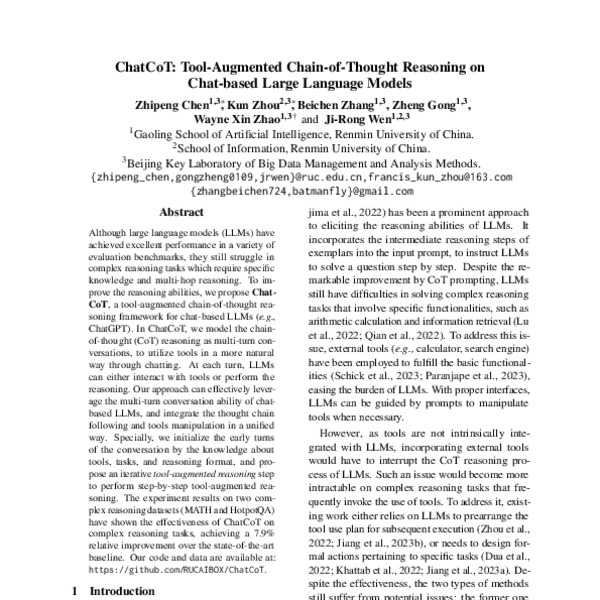
@inproceedings{chen-etal-2023-chatcot,
title = "{C}hat{C}o{T}: Tool-Augmented Chain-of-Thought Reasoning on Chat-based Large Language Models",
author = "Chen, Zhipeng and
Zhou, Kun and
Zhang, Beichen and
Gong, Zheng and
Zhao, Xin and
Wen, Ji-Rong",
editor = "Bouamor, Houda and
Pino, Juan and
Bali, Kalika",
booktitle = "Findings of the Association for Computational Linguistics: EMNLP 2023",
month = dec,
year = "2023",
address = "Singapore",
publisher = "Association for Computational Linguistics",
url = "https://aclanthology.org/2023.findings-emnlp.985",
doi = "10.18653/v1/2023.findings-emnlp.985",
pages = "14777--14790",
abstract = "Although large language models (LLMs) have achieved excellent performance in a variety of evaluation benchmarks, they still struggle in complex reasoning tasks which require specific knowledge and multi-hop reasoning. To improve the reasoning abilities, we propose $\textbf{ChatCoT}$, a tool-augmented chain-of-thought reasoning framework for chat-based LLMs ($\textit{e.g.,}$ ChatGPT). In ChatCoT, we model the chain-of-thought (CoT) reasoning as multi-turn conversations, to utilize tools in a more natural way through chatting. At each turn, LLMs can either interact with tools or perform the reasoning. Our approach can effectively leverage the multi-turn conversation ability of chat-based LLMs, and integrate the thought chain following and tools manipulation in a unified way. Specially, we initialize the early turns of the conversation by the knowledge about tools, tasks, and reasoning format, and propose an iterative $\textit{tool-augmented reasoning}$ step to perform step-by-step tool-augmented reasoning. The experiment results on two complex reasoning datasets (MATH and HotpotQA) have shown the effectiveness of ChatCoT on complex reasoning tasks, achieving a 7.9{\%} relative improvement over the state-of-the-art baseline.",
}
<?xml version="1.0" encoding="UTF-8"?>
<modsCollection xmlns="http://www.loc.gov/mods/v3">
<mods ID="chen-etal-2023-chatcot">
<titleInfo>
<title>ChatCoT: Tool-Augmented Chain-of-Thought Reasoning on Chat-based Large Language Models</title>
</titleInfo>
<name type="personal">
<namePart type="given">Zhipeng</namePart>
<namePart type="family">Chen</namePart>
<role>
<roleTerm authority="marcrelator" type="text">author</roleTerm>
</role>
</name>
<name type="personal">
<namePart type="given">Kun</namePart>
<namePart type="family">Zhou</namePart>
<role>
<roleTerm authority="marcrelator" type="text">author</roleTerm>
</role>
</name>
<name type="personal">
<namePart type="given">Beichen</namePart>
<namePart type="family">Zhang</namePart>
<role>
<roleTerm authority="marcrelator" type="text">author</roleTerm>
</role>
</name>
<name type="personal">
<namePart type="given">Zheng</namePart>
<namePart type="family">Gong</namePart>
<role>
<roleTerm authority="marcrelator" type="text">author</roleTerm>
</role>
</name>
<name type="personal">
<namePart type="given">Xin</namePart>
<namePart type="family">Zhao</namePart>
<role>
<roleTerm authority="marcrelator" type="text">author</roleTerm>
</role>
</name>
<name type="personal">
<namePart type="given">Ji-Rong</namePart>
<namePart type="family">Wen</namePart>
<role>
<roleTerm authority="marcrelator" type="text">author</roleTerm>
</role>
</name>
<originInfo>
<dateIssued>2023-12</dateIssued>
</originInfo>
<typeOfResource>text</typeOfResource>
<relatedItem type="host">
<titleInfo>
<title>Findings of the Association for Computational Linguistics: EMNLP 2023</title>
</titleInfo>
<name type="personal">
<namePart type="given">Houda</namePart>
<namePart type="family">Bouamor</namePart>
<role>
<roleTerm authority="marcrelator" type="text">editor</roleTerm>
</role>
</name>
<name type="personal">
<namePart type="given">Juan</namePart>
<namePart type="family">Pino</namePart>
<role>
<roleTerm authority="marcrelator" type="text">editor</roleTerm>
</role>
</name>
<name type="personal">
<namePart type="given">Kalika</namePart>
<namePart type="family">Bali</namePart>
<role>
<roleTerm authority="marcrelator" type="text">editor</roleTerm>
</role>
</name>
<originInfo>
<publisher>Association for Computational Linguistics</publisher>
<place>
<placeTerm type="text">Singapore</placeTerm>
</place>
</originInfo>
<genre authority="marcgt">conference publication</genre>
</relatedItem>
<abstract>Although large language models (LLMs) have achieved excellent performance in a variety of evaluation benchmarks, they still struggle in complex reasoning tasks which require specific knowledge and multi-hop reasoning. To improve the reasoning abilities, we propose ChatCoT, a tool-augmented chain-of-thought reasoning framework for chat-based LLMs (e.g., ChatGPT). In ChatCoT, we model the chain-of-thought (CoT) reasoning as multi-turn conversations, to utilize tools in a more natural way through chatting. At each turn, LLMs can either interact with tools or perform the reasoning. Our approach can effectively leverage the multi-turn conversation ability of chat-based LLMs, and integrate the thought chain following and tools manipulation in a unified way. Specially, we initialize the early turns of the conversation by the knowledge about tools, tasks, and reasoning format, and propose an iterative tool-augmented reasoning step to perform step-by-step tool-augmented reasoning. The experiment results on two complex reasoning datasets (MATH and HotpotQA) have shown the effectiveness of ChatCoT on complex reasoning tasks, achieving a 7.9% relative improvement over the state-of-the-art baseline.</abstract>
<identifier type="citekey">chen-etal-2023-chatcot</identifier>
<identifier type="doi">10.18653/v1/2023.findings-emnlp.985</identifier>
<location>
<url>https://aclanthology.org/2023.findings-emnlp.985</url>
</location>
<part>
<date>2023-12</date>
<extent unit="page">
<start>14777</start>
<end>14790</end>
</extent>
</part>
</mods>
</modsCollection>
%0 Conference Proceedings %T ChatCoT: Tool-Augmented Chain-of-Thought Reasoning on Chat-based Large Language Models %A Chen, Zhipeng %A Zhou, Kun %A Zhang, Beichen %A Gong, Zheng %A Zhao, Xin %A Wen, Ji-Rong %Y Bouamor, Houda %Y Pino, Juan %Y Bali, Kalika %S Findings of the Association for Computational Linguistics: EMNLP 2023 %D 2023 %8 December %I Association for Computational Linguistics %C Singapore %F chen-etal-2023-chatcot %X Although large language models (LLMs) have achieved excellent performance in a variety of evaluation benchmarks, they still struggle in complex reasoning tasks which require specific knowledge and multi-hop reasoning. To improve the reasoning abilities, we propose ChatCoT, a tool-augmented chain-of-thought reasoning framework for chat-based LLMs (e.g., ChatGPT). In ChatCoT, we model the chain-of-thought (CoT) reasoning as multi-turn conversations, to utilize tools in a more natural way through chatting. At each turn, LLMs can either interact with tools or perform the reasoning. Our approach can effectively leverage the multi-turn conversation ability of chat-based LLMs, and integrate the thought chain following and tools manipulation in a unified way. Specially, we initialize the early turns of the conversation by the knowledge about tools, tasks, and reasoning format, and propose an iterative tool-augmented reasoning step to perform step-by-step tool-augmented reasoning. The experiment results on two complex reasoning datasets (MATH and HotpotQA) have shown the effectiveness of ChatCoT on complex reasoning tasks, achieving a 7.9% relative improvement over the state-of-the-art baseline. %R 10.18653/v1/2023.findings-emnlp.985 %U https://aclanthology.org/2023.findings-emnlp.985 %U https://doi.org/10.18653/v1/2023.findings-emnlp.985 %P 14777-14790
Markdown (Informal)
[ChatCoT: Tool-Augmented Chain-of-Thought Reasoning on Chat-based Large Language Models](https://aclanthology.org/2023.findings-emnlp.985) (Chen et al., Findings 2023)





